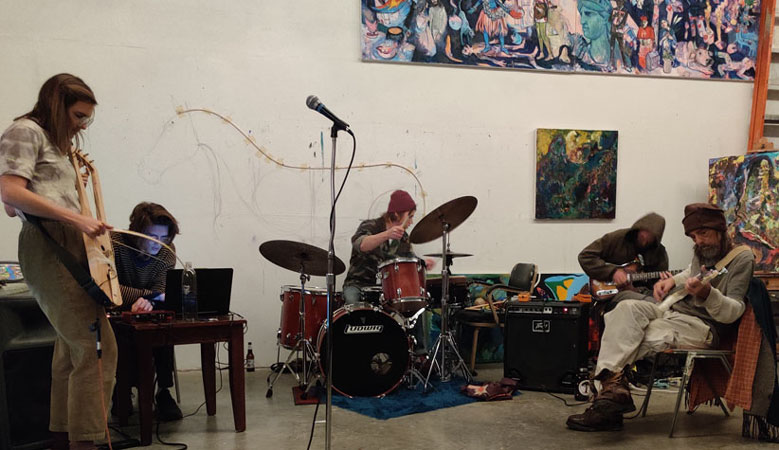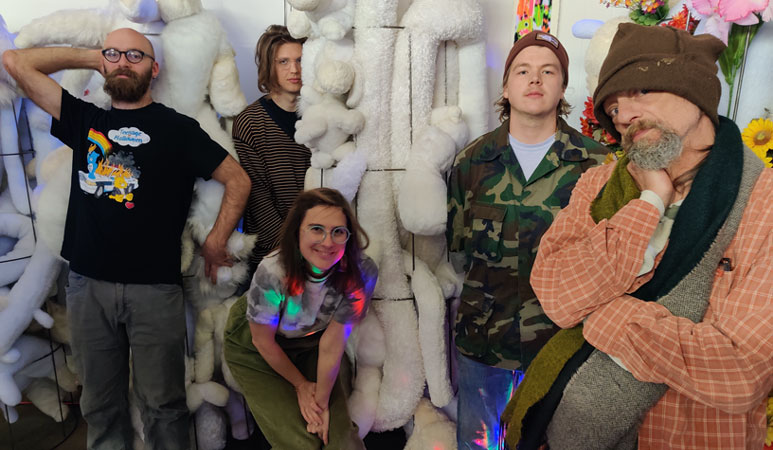Can Experimental Music Still Embrace Traditional Instruments?

by Wes Way
(February 2023)
My band recently played a small, but relatively well-attended night of experimental musicians at an art studio space in an industrial area. The acts consisted of a duo pecking at their laptops, one individual making sounds with a sheet of glass hooked up to a contact mic, one thrift store shaman manipulating pre-recorded sounds and assorted oddments, and us - guitar, bass, drums, tagelharpa (four-stringed lyre-like instrument), jaw harp and electronics. It was a wonderful event and everyone had a good time. I was not at all surprised that the outfit I was part of was the only act employing mostly regular instruments.
This particular show was the debut performance of my current ensemble - properly speaking, a duo, though we're always happy to have friends sit in - which is dedicated to free improvisation. When we play, we almost never have any idea what we're going to do. Somebody starts making sounds and other people make sounds as they see fit. There is no expectation that anyone will play anything like a rhythm or melody. Anyone may or may not repeat anything or not. If any combination of musicians happens to create some sort of "groove," no one else is obligated to join them, nor are any of the musicians in the groove expected to stay there. If someone was playing in the same key as me, I probably wouldn't notice and wouldn't care if I did.
The only thing that connects us to what most people in the West call "music" is the fact that we generally use traditional musical instruments. The two of us who form the core of the group are a drummer and a guitarist, but we've both been doing free improv and other forms of music for years. We talk occasionally about what we do and we seem to agree that listening and responding are important parts of doing free improv - pretty much all improv musicians would agree on that - and we are dedicated to egalitarianism in our group. We have no band leader - whether performing or not - and don't welcome participants who we think want to show off their chops. When we talk about our process, we aren't very precise. We don't discuss music theory or define terms. While playing, I am aware of what the drummer is doing - I can't not hear him - but I don't feel any compulsion to follow his rhythm. This is a good thing since he's not always playing in any time signature but sometimes I might actually follow his rhythm. Based on a few comments he's made, I assume he has an equally ambivalent attitude toward what I'm doing.
As the guitar player, when I do free improv, I usually have some sort of structure in my head that I'm more or less adhering to. I frequently employ patterns of notes as a homebase of sorts - either pieces of other people's compositions or something that I stumbled on and liked the sound of. I might switch to bass guitar on occasion - usually if there's another guitarist sitting in - and I have shown up with a banjo a few times. In earlier outfits, I tended to have a raft of effects pedals, but I've culled it down to a distortion pedal which I doubt I'll ever give up since I like the sound.
I've played many shows in art spaces, coffeeshops, bars and basements, almost always under the "experimental" heading. I've seen and heard a variety of different ways of making unusual sounds, which might be called 'music.' Many have been inventive and impressive; others not so much. I've gotten used to the presence of white guys with liberal arts degrees and laptops - sometimes fun, usually dull - and people with contact mics attached to random objects, which is great if they don't go longer than ten minutes. Shrieking harsh noise sets all sound exactly the same to me, but they can be entertaining. What I don't see very often is what I've always tried to be part of - a group of people showing up with instruments.
Breaking free from the confines of conventional structures is a fine and good thing to do, and I'm glad to be part of that struggle. I understand why someone would choose to make music with a sewing machine, a vibrator in a bucket or a rewired Teddy Ruxpin doll, but I'm not convinced that the full range of possibilities have been wrung out of the plain old electric six-string. Honestly, I'm not really that inventive - I use tunings that are "alternate." but not by much, and I generally play in one of the ancient Greek modes and I think I'm doing some interesting things with the combos I play with. Judging from the positive responses of the audiences, I'm not alone in that.
It is certainly harder to bring a group of people together to make free improv music than to open a laptop and start futzing about with a sound program. I live in a college town in an agricultural county in the Shenandoah Valley, Virginia, USA. Musicians here are interested in classic rock, indie pop, stoner metal and bluegrass. On the off chance that they have anything resembling success, they move somewhere else. The drummer and I have been involved in the local scene, such as it is, mostly in venues that presented themselves as "cool" and drew audiences that appeared more interested in hanging out and being seen than in whatever the musicians on stage were doing. Performing in front of people who don't care became tiresome and we both decided - individually - not to play locally. The overall lack of interest in experimental music around here extends to musicians - we're a duo because we couldn't find anyone else who was willing and/or able to commit. The friends who sit in with us are mostly folks who enjoy a bit of free exploration on the side of their primary projects. We'd love to have some brass in our jams, but there doesn't seem to be a horn player in this part of the state. I sometimes wonder if the simple fact that we bother to haul a full drum kit and other gear into the space and set it up is part of what makes people come up after we play and praise our efforts. There's a bit more work involved in using regular instruments than in running a contact mic'd electric toothbrush through the house PA.
At every show I've played, I've also been an audience member. Maybe I'm biased in favor of instruments because I play one, but I usually sit up when I see a combo with instruments setting up. I have greater expectations than I would if I saw someone plugging in a bunch of pedals and a vacuum cleaner. It's not that I haven't heard some amazing stuff from that kind of set, it's just that I'm aware that it's pretty easy to rely on the oddness of the source to make up for the fact that the sound is just a clunky buzz. It's possible to make a guitar sound like a radio between stations, but that takes a bit of effort and knowledge of the instrument's possibilities. You have to work at it a bit.
I'll continue to perform in basements and art studios, and I'll continue to carry a bunch of drums and amps. That's the way I like to do it. If the fact that we're the only act using regular instruments makes us stand out from the herd, that's fine with me.

Wes Way lives in Virginia and is a member of Sordid Amok!